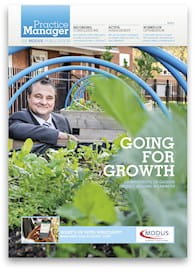SO MUCH absurdity, so few column inches. Welcome back to Diary where we ask for interesting and entertaining medical anecdotes from our readers, get nothing in reply and so make up our own. But let us not be bitter...
JAB! SLICE! SUCK! DRILL! Maybe best to skip the sound effects – but it’s been found that a comic-book approach to getting informed surgical consent can improve comprehension and reduce anxiety in patients facing complicated procedures. Researchers in Berlin developed a 15-page comic-style booklet to help inform patients undergoing cardiac catheterisation and stent insertion. A total of 121 patients were then recruited, with some undergoing standard consent only and the rest being additionally provided with the 'comic'. The researchers found that the latter scored better on a short recall test and also reported feeling less anxious and better prepared for cardiac catheterisation. Dr Anna Brand, one of the lead investigators, said: "We want to use future research to test whether similar positive effects can be achieved in patients undergoing other medical procedures." Source: OnMedica
VICTORY…ALBEIT BELATED It only took 150 years but seven female Edinburgh University students have finally been awarded their medical degrees. In 1869, Sophia Jex Baxter and six other women were allowed to enrol in medicine at the university but had to endure fierce hostility, not only from the public but from fellow male students, culminating in the Surgeon’s Hall Riot in November 1870 when they arrived to take an anatomy exam facing a mob and were pelted with mud and worse. Later the so-called Edinburgh Seven were refused graduation and forced to study elsewhere in Europe. This summer seven current female medical students at Edinburgh University accepted degree certificates on behalf of these pioneering women. Better late…
AMAZING DOCTOR AMAZON Diary has special pity for anyone this century with the misfortune to be named Alexa. Imagine the constant quips: Alexa, where’s my stuff? Alexa, play Rick Astley. Alexa, have you ever had sex? Add now to that requests for health advice. The NHS has announced plans to team up with Amazon to provide voice-assisted technology employing algorithms that tap into information from the NHS website to provide answers to questions such as: Alexa, how do I treat a migraine? or Alexa, what are the symptoms of flu? The aim is to help patients, especially the elderly, blind and those who cannot access the internet through traditional means, to get professional, NHS-verified health information using simple voice commands. The Government says: "It is hoped the technology will reduce pressure on the NHS and GPs by providing information for common illnesses." Just remember to shut the windows at night to keep out the surgical cyberspiders.
WEAPONISED TICKS It may sound like the ultimate fantasist "told you so" but the US House of Representatives has ordered the Pentagon to conduct a review of whether the defence department experimented with using ticks and other insects as biological weapons. The review was demanded by New Jersey Republican Chris Smith and prompted by "books and articles" exploring research carried out at a biological research unit on Plum Island, which lies across a narrow stretch of water from the community of Lyme, Connecticut. Here in 1975 a cluster of paediatric arthritic illness was later associated with infection by the spirochete Borrelia burgdorferi and thereafter commonly referred to as Lyme disease. Smith wants to know if medical entomologist (and B. burgdorferi namesake) Wilhelm Burgdorfer may have worked for the US Government, breeding ticks and injecting them with various pathogens. Nice. Source: BMJ
CHOICE WORDS A recent study by linguists at Lancaster University used computer software to analyse over 29 million words used to describe various healthcare professionals in comments posted by patients on the NHS Choices website. Surgeons came out best being described by positive words 98 per cent of the time ('brilliant', 'outstanding'), followed by dentists 96 per cent ('great', 'the best'), midwives 93 per cent ('amazing', 'exceptional') and nurses 90 per cent ('lovely'). Not surprisingly receptionists in the firing line fared less well, attracting positive terms only 57 per cent of the time, along with some choice negative words, including 'useless, rude, unprofessional, unhelpful, arrogant, patronising, aggressive and terrible'. Lead researcher Professor Paul Baker, commented: "Rather than suggesting that receptionists need retraining or that surgeons deserve pay rises, we instead noted that feedback is very much linked to expectations and constraints around different staff roles…In other words they [receptionists] are often taking the flak for things that are not their fault but actually are indicative of patient frustration at bigger systemic issues – fewer appointments and longer waiting times are more likely to be the result of funding shortages that are beyond the receptionist’s control." So how about we give them a break!
WALLBEING In his new book, professor and researcher of complementary medicine Edzard Ernst describes a treatment offered by a pharmacy in London, known as "Murus Berlinensis" – a diluted solution of ground concrete from the Berlin Wall mixed with alcohol and water, aimed at people with symptoms of depression and asthma. A 100 ml quantity with "medicating potency" sells for £64.50. Ernst comments: "People tend to think homeopathy is based on natural substances, but Berlin Wall shows that it’s not true. It’s not only bonkers but ineffective." Source: BMJ
This page was correct at the time of publication. Any guidance is intended as general guidance for members only. If you are a member and need specific advice relating to your own circumstances, please contact one of our advisers.
Read more from this issue of Practice Manager

Save this article
Save this article to a list of favourite articles which members can access in their account.
Save to library